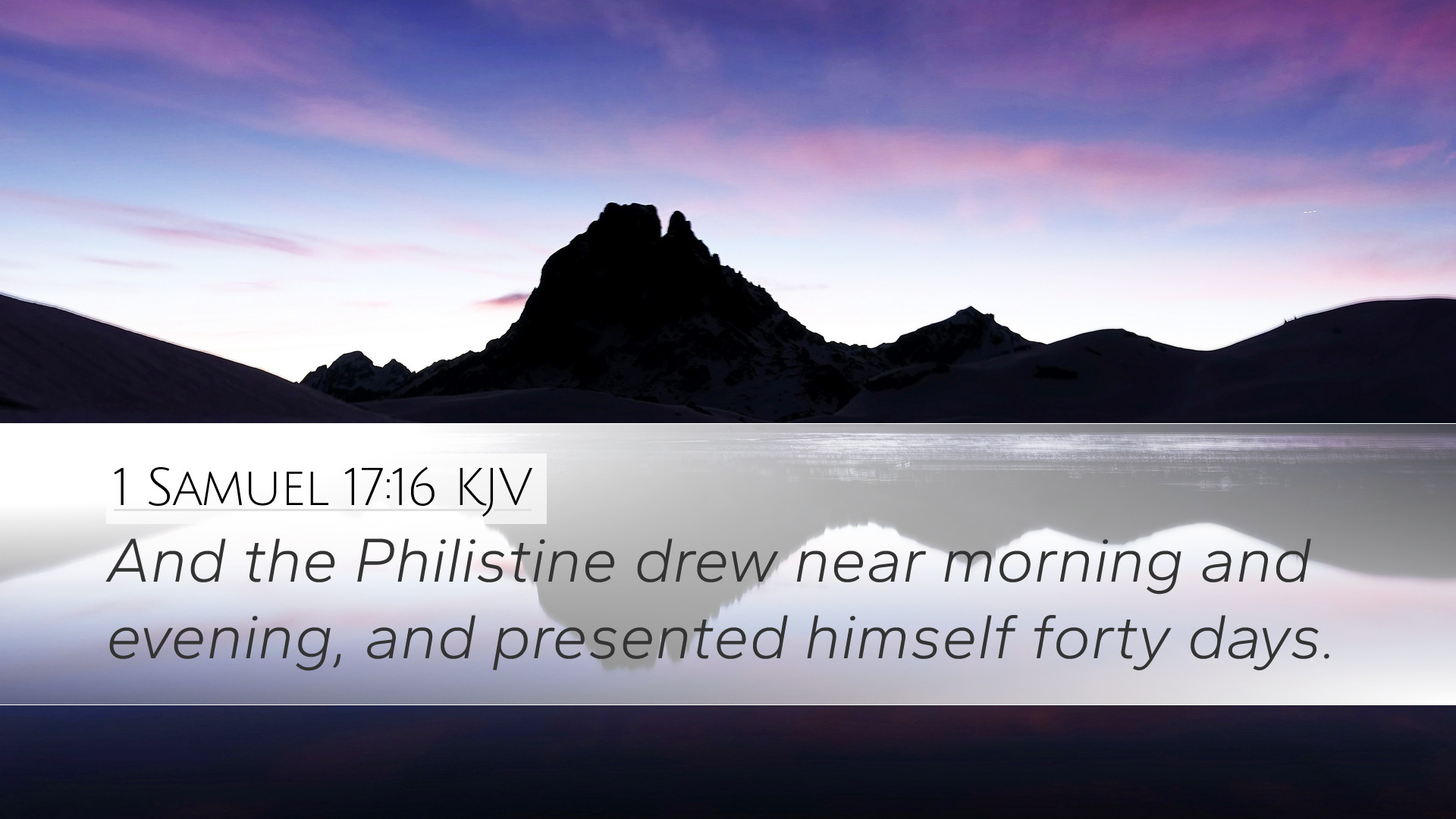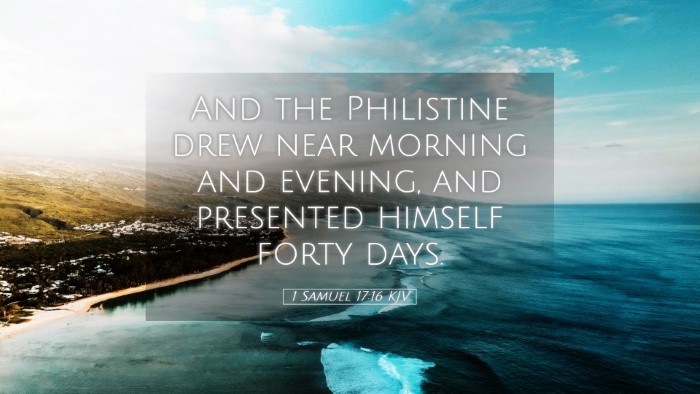Commentary on 1 Samuel 17:16
This verse serves as a pivotal moment in the narrative of David and Goliath, encapsulating themes of faith, fear, and divine providence. It reads:
"And the Philistine drew near morning and evening, and presented himself forty days." (1 Samuel 17:16, KJV)
Contextual Overview
The events leading to this verse take place during a time of conflict between the Israelites and the Philistines, where Goliath, a giant of the Philistine army, boasts for 40 days, challenging any Israelite to combat him. This situation reflects the despair and fear that had overtaken Saul and his men.
Theological Significance
This verse highlights not just the physical confrontation, but the spiritual implications of fear and courage in the face of seemingly insurmountable odds.
1. The Cycle of Challenge
Matthew Henry emphasizes that Goliath's daily taunts for 40 days symbolize the ongoing and relentless nature of temptation and fear. Each day, Goliath calling out reaffirms the people's dread, which is reflective of spiritual battles we face in life.
2. Seasons of Testing
Albert Barnes notes that the 40 days are significant, drawing parallels to the 40 years Israel spent wandering in the wilderness. This period signifies a testing of faith, urging believers to recognize their own spiritual struggles and the necessity of perseverance.
3. Divine Appointment
Adam Clarke interprets the long duration of Goliath's challenge as a divine setup for David’s entrance into God’s purpose. He stresses that God often allows situations to persist to prepare His anointed for a mighty act of deliverance.
Insights into Leadership and Courage
This verse speaks volumes about the nature of leadership in times of crisis. It exposes the fear of Saul and the Israelite army, contrasting this with the spirit of David.
The Reaction of Saul and the Israelites
Saul's desperation during this time is an insight into human leadership devoid of faith. Instead of seeking God, he allows the fear of man to dominate the hearts of the soldiers. Matthew Henry remarks that the lack of courageous leadership in Saul leads the entire Israelite army into a state of paralysis.
The Example of David
David, though young and inexperienced, emerges as a foil to King Saul. His future encounter with Goliath marks the transition from fear to faith. Albert Barnes posits that David's identity as a shepherd foreshadows Christ, the ultimate shepherd who would confront evil decisively.
Understanding Goliath’s Role
Goliath's character is more than just a physical embodiment of fear; he represents the opposition against God's people. His defiance serves not only as a literal challenge but also a metaphorical one, embodying sin and the forces that stand against the righteousness of God.
The Challenge of the Giant
This verse encapsulates the nature of challenges believers face. The daily threats posed by Goliath can be seen as representing the persistent issues of life that engage believers on all fronts. Adam Clarke highlights the importance of recognizing these giants in our lives and preparing to take action in faith rather than succumbing to fear.
Application for Believers Today
1 Samuel 17:16 provides timeless principles for modern believers, pastors, and theologians:
- Recognize the Challenges: Just as Goliath posed a daunting challenge to Israel, believers today face myriad spiritual, emotional, and societal giants that require a response of faith.
- Persevere in Faith: The period of Goliath's threats tests the resolve of God's people. Believers are called to stand steadfast, relying on God’s promises.
- Act in Courage: David’s ultimate victory over Goliath encourages believers to confront their fears head-on, trusting in the Lord’s strength to overcome challenges.
- Leadership in Crisis: This verse highlights the need for true leaders who rely on God in difficult times, rallying others towards faith rather than fear.
Conclusion
1 Samuel 17:16 is a rich text that offers a plethora of insights into the human condition, divine providence, courage, and faith. By reflecting on this narrative, pastors, students, and scholars are reminded of the importance of looking beyond the giants in our lives to the God who empowers us to overcome.


